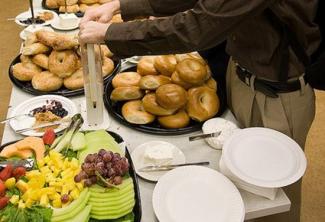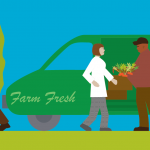Buy-in for Buying Healthy: Stepping Up Government Purchasing
Community leaders in Long Beach were working on a new policy that would set healthier standards for snacks and drinks purchased by city agencies.
But it quickly became clear that to get the buy-in they needed, they’d have to clear up some misconceptions about exactly what the proposed policy would do.
So they called on ChangeLab Solutions for help – and by the time the policy came up for consideration, even a city councilmember who’d initially called it too "Big Brother” changed her mind and gave it her vote.
Taking the lead
Long Beach is the second-largest city in Los Angeles County and, according to a report in USA Today, the most ethnically diverse large city in the United States.
The city received funding from the Los Angeles County Department of Public Health’s RENEW LA County initiative (Renew Environments for Nutrition, Exercise, and Wellness), a program funded by the U.S. Centers for Disease Control and Prevention.
Setting healthier standards for snacks and drinks at city events was identified right from the get-go as a priority for Long Beach.
“Our goal was for the city to take the lead in setting an example,” says Ron Arias, director of the Long Beach Department of Health.
The proposed policy set nutrition standards for products sold in vending machines on city property, and for snacks and beverages purchased by the city for events and meetings.
The standards essentially eliminated sugar-sweetened beverages, limited artificially sweetened beverages, and limited the amount of sugar, fat, sodium, and calories in snacks.
Confusion about the standards
The policy caused some concern, however, among city employees who imagined they’d have to perform complicated calculations to figure out whether certain snacks were allowed, or that they wouldn’t be able to bring in a cake for a coworker’s birthday.
"It took a little bit of effort in terms of educating everyone."
“People conjure up all kinds of draconian outcomes,” says Ron. “We weren’t talking about what coworkers can do on a day-to-day basis. If you want to bring in cookies or doughnuts – that wasn’t restricted. We were focused on city-sponsored events, where they provide snacks as part of that class or session or activity."
"It took a little bit of effort in terms of educating everyone that we weren’t going to become the policy that restricted candy at Halloween,” Ron says.
Health department officials organized trainings for kids and adults to help build community members’ support and advocacy skills.
Staff from ChangeLab Solutions helped lead the trainings, sharing strategies and stories from other communities that had successfully tackled similar policies.
"This is so Big Brother"
When the policy was introduced before the city council, one councilmember, Rae Gabelich, stated that she was fine with setting standards for youth-oriented venues but couldn’t get behind a policy that included city-sponsored meetings and events.
“When we start to articulate policies that are restrictive, we have to make clear how this works and how it benefits the entire community."
“This is so Big Brother to me,” she declared at the meeting. “It’s overcontrol.”
But after hearing local kids and other community members testify in support of the policy, she confessed that she’d changed her mind – and the city council went on to pass the new standards.
“When we start to articulate policies that are restrictive, we have to make clear how this works and how it benefits the entire community,” says Ron. “It’s not always obvious."
"With tobacco, we had the negative impacts of secondhand smoke affecting other people’s health," he adds. "With the beverage and snack policies, we don’t have the same smoking gun type of consequence - that consuming these products hurts other people. But in the end, it does.”
2/8/2013
Photograph by U.S. Department of Agriculture, CC BY 2.0 DEED, via Flickr

